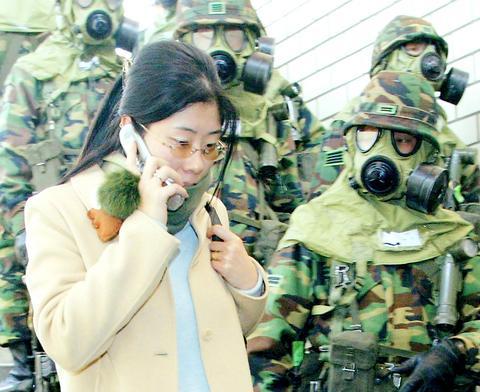The South Korean government said yesterday it would crack down on political unrest as financial markets brushed off fears of instability to bounce back on the first working day following the impeachment of President Roh Moo-hyun.
Candlelight protests that drew tens of thousands of people to the streets of Seoul for the past two nights were outlawed as interim leader, Prime Minister Goh Kun, pledged to restore stability to the economy, guarantee security and oversee the run-up to crucial April 15 general elections.

PHOTO: AP
Any political unrest would be harshly dealt with, the government warned.
"Any moves or rallies that cause social disorder will be strictly dealt with in accordance with laws and principle," a government statement said.
Earlier, police outlawed candlelight rallies that drew some 100,000 people to the streets of Seoul over the weekend.
"Evening candlelight rallies in the street are illegal," said senior police superintendent Kim Ok-jeon, in charge of security in Seoul.
"According to the law, we will use force to disperse rallies if participants pay no heed to repeated warnings to disperse," Kim said.
Goh, 66, said he would ensure government neutrality in the run-up to next month's election.
"With just 30 days to go before the elections, we face a difficult political situation," Goh said following a Cabinet meeting. "The government must maintain its neutrality for fair elections."
Roh's impeachment polarized politics and inflamed passions here and protesters said they planned daily demonstrations in the run-up to next month's vote.
North Korea condemned the National Assembly vote to unseat Roh and pulled out of inter-Korean economic talks scheduled to start yesterday in South Korea after demanding a change of venue, citing political unrest sparked by the
impeachment.
The South's Unification Ministry accused the North of seeking to exploit its problems and has expressed regret in a letter sent to Pyongyang.
North Korea termed the impeachment a political rebellion against the wishes of tens of millions of South Korean people and said the US was behind the move.
Goh has already put South Korea's 700,000-strong military on heightened alert to counter Pyong-yang, engaged in a 13-month nuclear standoff which is considered a major threat to world peace.
Washington has declined to comment on the impeachment saga, saying the matter was South Korea's internal affair.
Finance Minister Lee Hun-jae has attempted to reassure the markets and international investors that political instability will not trouble the tentative economic recovery in Asia's fourth largest economy.
The two main opposition parties, the Grand National Party and the Millennium Democratic Party, joined forces to impeach Roh last Friday after he was reprimanded by a government watchdog for illegal electioneering before general elections scheduled for April 15.
More than 70 percent of South Koreans opposed impeachment, according to opinion polls.
Roh was suspended from office following the vote and Goh took over as interim president. The case is under review by the Constitutional Court which will rule within 180 days whether to uphold the vote or restore Roh to power.

PRECARIOUS RELATIONS: Commentators in Saudi Arabia accuse the UAE of growing too bold, backing forces at odds with Saudi interests in various conflicts A Saudi Arabian media campaign targeting the United Arab Emirates (UAE) has deepened the Gulf’s worst row in years, stoking fears of a damaging fall-out in the financial heart of the Middle East. Fiery accusations of rights abuses and betrayal have circulated for weeks in state-run and social media after a brief conflict in Yemen, where Saudi airstrikes quelled an offensive by UAE-backed separatists. The United Arab Emirates is “investing in chaos and supporting secessionists” from Libya to Yemen and the Horn of Africa, Saudi Arabia’s al-Ekhbariya TV charged in a report this week. Such invective has been unheard of

US President Donald Trump on Saturday warned Canada that if it concludes a trade deal with China, he would impose a 100 percent tariff on all goods coming over the border. Relations between the US and its northern neighbor have been rocky since Trump returned to the White House a year ago, with spats over trade and Canadian Prime Minister Mark Carney decrying a “rupture” in the US-led global order. During a visit to Beijing earlier this month, Carney hailed a “new strategic partnership” with China that resulted in a “preliminary, but landmark trade agreement” to reduce tariffs — but

Chinese President Xi Jinping’s (習近平) purge of his most senior general is driven by his effort to both secure “total control” of his military and root out corruption, US Ambassador to China David Perdue said told Bloomberg Television yesterday. The probe into Zhang Youxia (張又俠), Xi’s second-in-command, announced over the weekend, is a “major development,” Perdue said, citing the family connections the vice chair of China’s apex military commission has with Xi. Chinese authorities said Zhang was being investigated for suspected serious discipline and law violations, without disclosing further details. “I take him at his word that there’s a corruption effort under

China executed 11 people linked to Myanmar criminal gangs, including “key members” of telecom scam operations, state media reported yesterday, as Beijing toughens its response to the sprawling, transnational industry. Fraud compounds where scammers lure Internet users into fake romantic relationships and cryptocurrency investments have flourished across Southeast Asia, including in Myanmar. Initially largely targeting Chinese speakers, the criminal groups behind the compounds have expanded operations into multiple languages to steal from victims around the world. Those conducting the scams are sometimes willing con artists, and other times trafficked foreign nationals forced to work. In the past few years, Beijing has stepped up cooperation